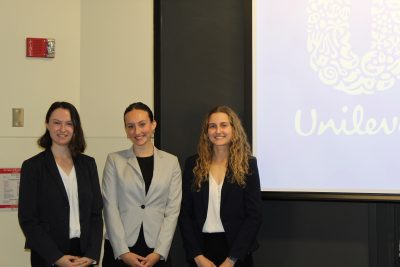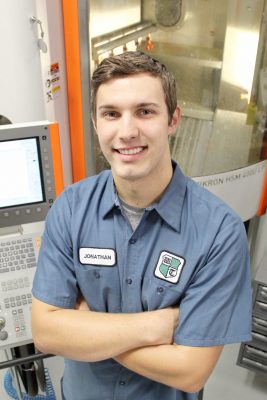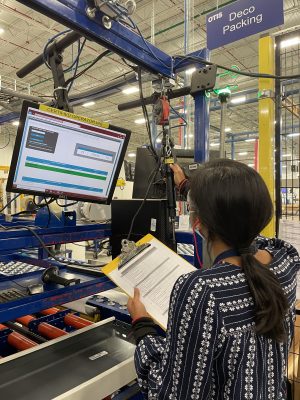
Last month, Management and Engineering for Manufacturing and Operations and Information Management partnered with Unilever to bring students a Supply Chain Case Competition. Eleven teams of three students each competed to develop a plan to resolve a mock supply chain issue for Unilever’s brand Lipton and their green tea product.
Students were given a challenge with some background information, and two weeks to develop a comprehensive plan to solve the problem. In this case, the problem was procuring an organic green tea from a new supplier in Vietnam as the first organic green tea in the Lipton product range, and operating in line with the company’s guiding principles of safety, quality and operating efficiency. Students were also given Unilever company values of improving health and well-being, reducing environmental impact, and enhancing livelihoods, as well as references to the company’s sustainable living goals. The plans they suggested had to factor in these sometimes competing goals as they prepared and presented their strategy. Data on supply chain and sourcing, green tea facts, as well as product consumption and demand were also given to the teams to take into consideration.
Teams made their presentations in front of a panel of judges including faculty from the School of Business, the School of Engineering, and Unilever supply chain representatives. After their presentations, the judges were able to ask them questions to further clarify and challenge the students’ ideas.
Luca Mastrogiacomo, junior and a Management Engineering for Manufacturing major, says he really appreciated the opportunity to see how supply chain problems look in real world settings. “It showed why supply chain is important because of how interconnected it is with all areas of a business and how a supplier relationship is so much more than just transactional,” he said. “It was very fulfilling to me to be able to actually apply what I’ve been learning in class to a real business problem.”
The case competition served as part of the Supply Chain Management course taught by Dr. Craig Calvert. Students in the supply chain course were required to participate and provide a report following it for the class, while additional students joined from other engineering and business school majors because they were eager to showcase their critical business skills and win coveted scholarships associated with the first, second and third place winning teams.
The breadth of majors found among team members was also beneficial. Students said they found extra value in working with other students on a team beyond their own major. “It was fun because I was able to do it with some of my friends from the supply chain class,” said Paige Lombardi, Management and Engineering for Manufacturing senior, “…since Chloe is an MIS major and Liz and I are MEM majors, we were able to see how the two different majors interpreted the case differently. The case study was beneficial to me because it allowed me to use the knowledge from my internship experience as well as what I have learned in my supply chain class with Professor Calvert this semester and apply it to a real-world case study.”
Top Three Teams
- First place was awarded to Team Blue, a team consisting of Cara Tran, Biomedical Engineering senior; Prabhas KC, Economics senior; and Alexander Kim, Finance senior.
- Second place was award to team Supply Chain Reign including Elizabeth Downey, MEM senior; Paige Lombardi, MEM senior; and Chloe Sainsbury, MIS senior.
- Third place was awarded to Andrew Warshavsky, MIS senior; Luca Mastrogiacomo, MEM senior; and Jacob Patterson, MEM senior.
 MEM Junior, Jonathan Varga, joined MEM the spring of his sophomore year after entering UConn as an ACES student; however, he always knew he would choose Management and Engineering for Manufacturing (MEM) as his major. Graduating valedictorian of his high school, Harvard H. Ellis Technical High School in Danielson, Connecticut, Varga knew he wanted to work in manufacturing and used the unique opportunity that technical high school provided him to prepare him for a degree program.
MEM Junior, Jonathan Varga, joined MEM the spring of his sophomore year after entering UConn as an ACES student; however, he always knew he would choose Management and Engineering for Manufacturing (MEM) as his major. Graduating valedictorian of his high school, Harvard H. Ellis Technical High School in Danielson, Connecticut, Varga knew he wanted to work in manufacturing and used the unique opportunity that technical high school provided him to prepare him for a degree program. The Buffalo, New York resident said he came to UConn because of the MEM program and because there really isn’t anything quite like it anywhere else. While there are a few similar programs at one or two other universities, no other program balances both business and engineering quite like MEM.
The Buffalo, New York resident said he came to UConn because of the MEM program and because there really isn’t anything quite like it anywhere else. While there are a few similar programs at one or two other universities, no other program balances both business and engineering quite like MEM.
 Dr. Liang Zhang, Associate Professor in Electrical and Computer Engineering and MEM Faculty member, was recently awarded a grant that could change the face of Connecticut manufacturing. In a partnership between the University of Connecticut and the University of New Haven, Dr. Zhang will be leading the UConn team as they participate in a massive national research effort to help local manufacturers reduce their carbon footprint.
Dr. Liang Zhang, Associate Professor in Electrical and Computer Engineering and MEM Faculty member, was recently awarded a grant that could change the face of Connecticut manufacturing. In a partnership between the University of Connecticut and the University of New Haven, Dr. Zhang will be leading the UConn team as they participate in a massive national research effort to help local manufacturers reduce their carbon footprint.